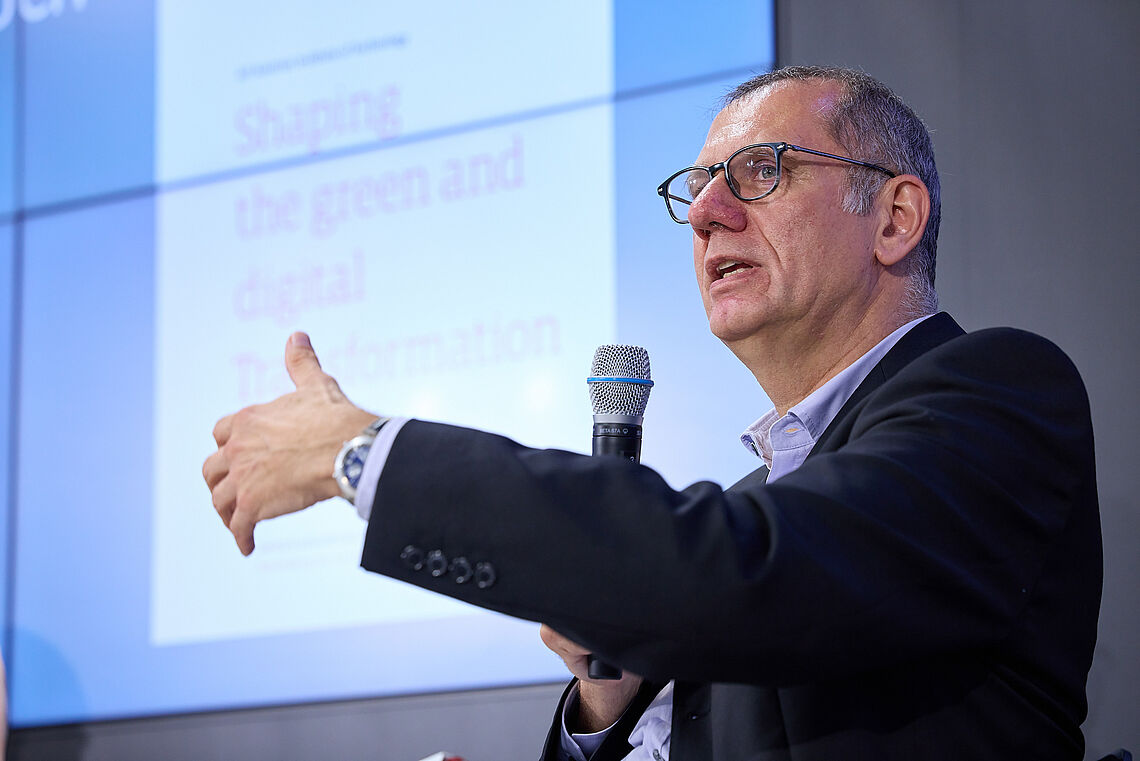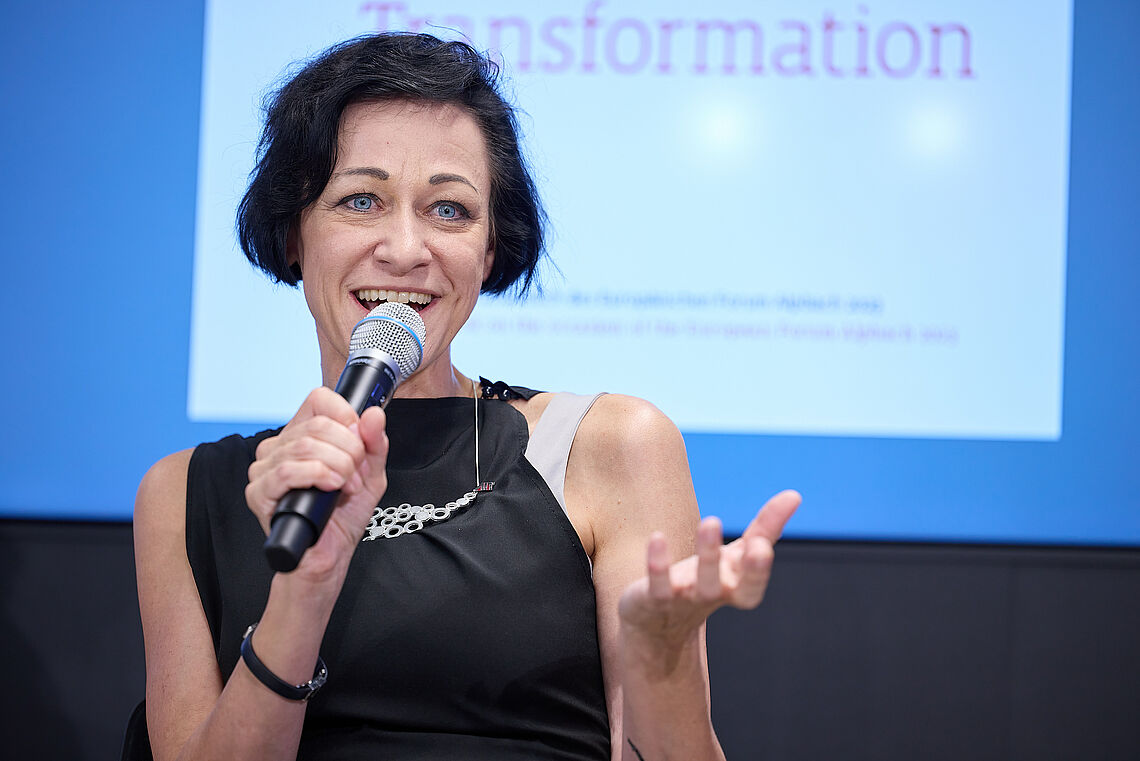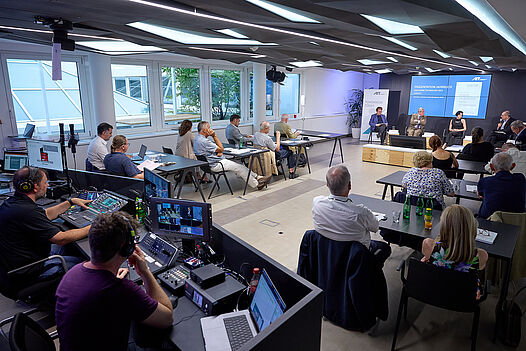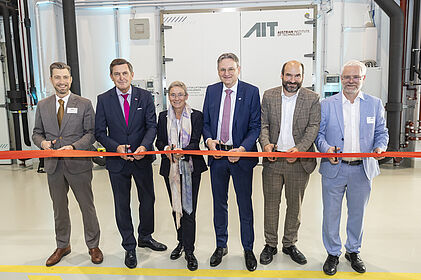The yearbook "Discussing Technology" of the AIT Austrian Institute of Technology for the European Forum Alpbach 2023 deals with the topic "Twin Transition": How can we shape the green and digital transformation that is currently taking place in parallels?
The world is undergoing a profound transformation process. The EU has coined the term "twin transition" for the digital and "green" transformation that is currently taking place in simultaneous fashion: the aim is to reduce CO2 emissions and resource consumption while at the same time enabling a more sustainable and efficient way of living, working and producing through digitalisation. This entails complex changes to our economic and social system and requires numerous innovations in technologies, production and lifestyles. The question is how we can best shape these transformations to achieve our goals - for example, to effectively combat man-made global warming, to use resources more sparingly and to use digitalisation for the best for us humans and society.
Answers are provided by this year's yearbook "Discussing Technology" on the topic of "Shaping the green and digital transformation", which the AIT Austrian Institute of Technology is publishing - for the seventh time now - on the occasion of the European Forum Alpbach.
To prevent tensions from becoming systemic breakdowns
The first question is how transformations occur in the first place and how they typically take place. "Transformations always occur when the tensions between different social developments - such as technological, economic or social - become too great," explains innovation researcher Matthias Weber (Head of Center for Innovation Systems & Policy at AIT). These tensions can take two possible courses: Either they can manifest themselves in massive system disruptions or even collapses, which therefore force major changes in the social and economic system or allow a readiness for structural changes. Otherwise, a conscious and forward-looking attempt is made to adapt systems structurally and institutionally in such a way that system disruptions do not occur. "You can't keep transformations under control and manage them in detail", Weber emphasises. The processes are far too complex for that. After all, technological developments - which usually play a central role in transformations - are always inextricably linked to social, economic and ecological processes. "But you can define certain guard rails between which there is room for dynamic development in which new things can emerge", says the expert.

„Transformationen sind immer ein Zusammenspiel zwischen sozialen und technologischen Entwicklungen“
Matthias Weber, Innovationsforscher am AIT


How humans shape technologies
A good example of this is digitalisation. The ongoing digital transformation is not so much about complicated technology, but rather about designing technology in such a way that it has real added value, as digitalisation expert Helmut Leopold, Head of Center for Digital Safety & Security at the AIT, makes clear: The decisive factor is therefore the design of technology and its correct use ("technology shaping"). This is a major factor in determining how people view the innovations. "The biggest enemy of a reasonable digital safety and security is the technology. On the contrary, you have to engage with the technologies and build up know-how for a sovereign use of technology", says Leopold.
Change in the industry and energy sector
Industry also has to face up to the developments. Innovation researcher Karl-Heinz Leitner (University of Graz, AIT) sees major differences to "industrial change" as it has been understood so far: On one hand, it is now about a targeted conversion of production and all processes under great time pressure - the drivers are politics and customers. On the other hand, many branches of industry are being challenged at the same time, but in different ways. Moreover, the industrial transformation requires the development of new infrastructures and the coordination of different policy fields. Leitner argues that this complex systemic change should also be seen as an opportunity to develop product innovations with the new processes, which can be used to open up new markets and finance the necessary investments. In Leitner's view, Austria's industry is well positioned for this transformation. However, one has to worry about those companies that are already hardly innovative or not innovative at all.
In the eyes of energy researcher Wolfgang Hribernik (Head of Center for Energy at the AIT), the next important step in the ongoing transformation of our energy system ("energy transition") is an overview of many different sectors. Among other things, more intensive sector coupling is necessary - for example between electricity and heat (via heat pumps) or between energy and process materials (such as hydrogen or the utilisation of CO2). In all areas - from transport to buildings to industry - strong interventions in existing infrastructures are necessary in any case, according to Hribernik. In large research projects, such as the NEFI (New Energy for Industry) innovation network, concrete technologies are currently being tested and roadmaps or transformation paths are being developed.
Mega-task mobility transition
One example of how far-reaching the necessary changes are is the mobility sector. Alexandra Millonig, mobility researcher at the AIT, explains that the politically demanded 95% reduction in CO2 emissions by 2050 means that - if our current mobility habits remain unchanged - we would only be able to travel 1.5 kilometres by car every day; by train it would still be eleven kilometres. This is obviously not enough to satisfy our mobility needs. Therefore, a fundamental rethink is needed, says Millonig: The question "How to get from A to B" should no longer be in focus, but rather the questions "Where does B have to be?" or "Why do we want or need to go to B at all?" "Mobility turnaround therefore means not only optimising and decarbonising the mobility system, but much more: you have to start with the causes of mobility," says Millonig. This means, among other things, that the accessibility of destinations that we regularly travel to must be improved - for example, by maintaining local supply or a smarter choice of locations for offices, for example. "What is not possible locally can perhaps be shifted to the virtual, such as official journeys or meetings. And the remaining need for mobility should be met as sustainably as possible." The (small and electric) car is the last option if nothing else is possible.

„It's not about improving how I get from A to B, but about looking at why I have to go to B in the first place.“
Alexandra Millonig, Mobility Researcher at AIT


Lifestyle is a decisive factor
An essential core element of transformation is people's behaviour - i.e. how we deal with the upheavals of our economic and social system in our own environment. For example, many experts are thinking about what a "Paris-compliant" lifestyle - alluding to the Paris Agreement on Climate Change concluded in 2015 - would look like and how one could convince people that certain lifestyle changes do not have to be a renunciation, but rather enrich life. A highly topical research topic here is so-called "social tipping points" - these are certain points in a system where even small changes lead to abrupt change. Through positive feedback, for example, a minority that follows a certain lifestyle can change the behaviour of society as a whole. One of the areas currently being explored is where to start - education and housing, financial markets or energy production are considered promising. Urban spaces are of central importance in this context - because it is relatively easy to reach critical masses for change in cities. To support urban transformation processes, a whole range of instruments has been developed in recent years, at the core of which is the participation of a wide variety of stakeholders and actors.
Geopolitical tensions and options for the future
The green and digital transformation is taking place in a planetary and geopolitical framework that is marked by numerous tensions. Hannes Androsch (initiator and idea generator of the yearbook series "Discussing Technology") argues that a successful "TwinTransition" is a central prerequisite for the resolution of the "tragedy of the planetary commons" - i.e. for a provision for the planetary commons (such as the atmosphere, oceans, water supply, forests, etc.), without which there is no global common good. Currently, there is no one who cares about the overall interests of the planet, beyond self-interest. Geopolitically, the world is currently marked by a struggle between China and the USA for supremacy, which also manifests itself in the technological field: Whoever is ahead in technological development will leave its mark on the world in the future. This is clearly visible, for example, in the transpacific "chip war" - in which Europe, as in many other areas, stands between the fronts and struggles for its geostrategic importance.
The framework of thought in which we move and our expectations for the future are also decisive for the success of the "Twin Transition", emphasises the innovation researcher and designated rector of the University of Applied Arts Vienna, Petra Schaper Rinkel. She sees an integrative understanding of the world that can be generated from sciences and arts as essential for shaping the upcoming transformations. Schaper Rinkel argues for seeing sciences (including their productive contestation) not only as a method for systematic knowledge generation, but also as creative and inventive practices to develop sustainable and democratic options for the future. Such "futures" are the basis for designing socio-technical transformation and innovation paths. Appropriate space should be given to this scientifically and artistically supported speculation.

„A successful ecological and digital transformation is a central prerequisite for resolving the "tragedy of the planetary commons" - i.e. for providing for the planetary commons (such as the atmosphere and water supply).“
Hannes Androsch, former Vice-Chancellor, industrialist, initiator and originator of the yearbook series "Discussing Technology".


Yearbook "Discussing Technology" 2023: Shaping the green and digital Transformation
In addition to general aspects and a theory of transformation, the yearbook discusses numerous areas in which transformation manifests itself - from the "energy turnaround" and smart urbanisation to new forms of mobility and production and topics such as the circular economy, geopolitics and the role of sciences and the arts. In the contributions, Hannes Androsch, Gudrun Haindlmaier, Wolfgang Hribernik, Martin Kugler, Karl-Heinz Leitner, Helmut Leopold, Alexandra Millonig, Petra Schaper Rinkel and Matthias Weber have their say in detail. Reference is also made to research results by Ulrich Brand (University of Vienna), Andreas Novy (Vienna University of Economics and Business), Margarete Haderer (Vienna University of Technology), Ilona Otto (University of Graz), Helmut Haberl (BOKU Vienna) and Andreas Reinstaller (WIFO). The presentations focus in particular on current development trends and the possibilities for shaping the transformation.




